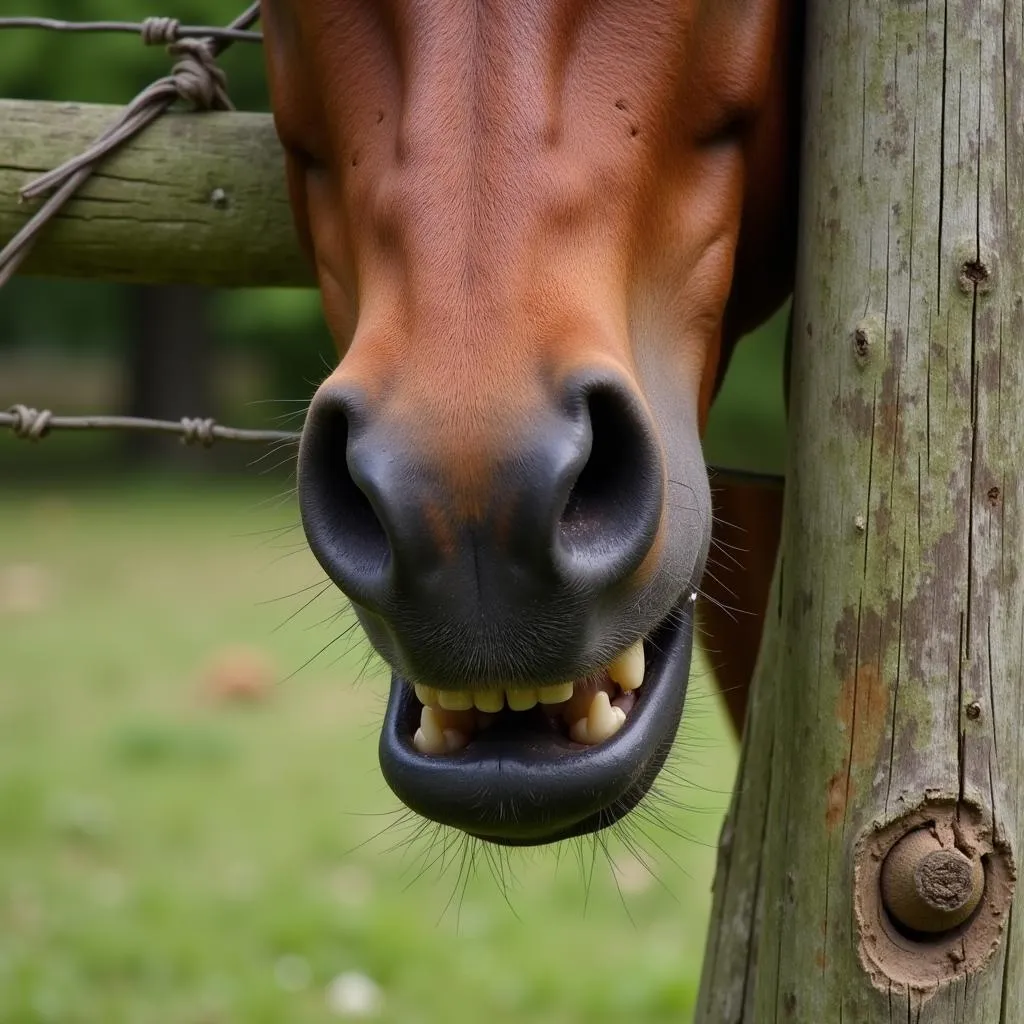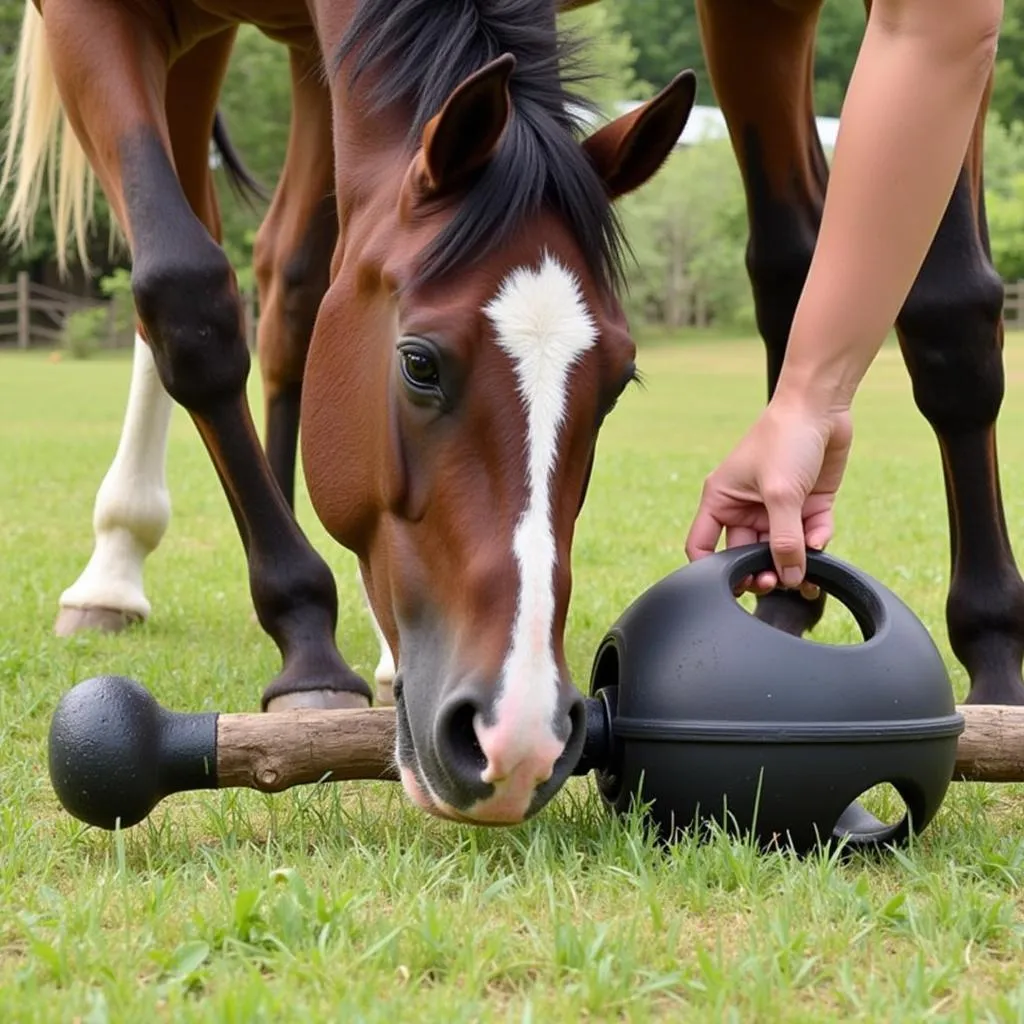When it comes to horses, their curious nature often leads them to nibble and chew on anything within reach. While this might seem harmless, it can pose serious threats to their health and well-being. Understanding why horses chew and how to prevent destructive chewing habits is crucial for every horse owner. That’s where “no chew” solutions come in, offering a safe and effective way to protect your equine companions.
Why Do Horses Chew?
Horses are grazing animals, naturally inclined to chew for a significant portion of the day. Their teeth continuously grow, and chewing helps wear them down to a manageable length. However, several factors beyond natural instinct can trigger excessive or destructive chewing:
- Boredom: Just like humans, horses get bored. Confined spaces, lack of mental stimulation, and insufficient exercise can lead them to find solace in chewing on fences, stalls, or any available object.
- Nutritional Deficiencies: If a horse’s diet lacks essential nutrients, such as fiber or minerals, they might resort to chewing on wood, dirt, or even manure to compensate.
- Stress and Anxiety: Horses experiencing stress due to changes in routine, social isolation, or environmental factors may develop nervous chewing habits.
- Medical Conditions: Underlying medical conditions like dental problems, gastric ulcers, or parasites can manifest as increased chewing behavior.
Dangers of Uncontrolled Chewing
Allowing your horse to chew on anything and everything can have dire consequences:
- Injury: Sharp objects or splintered wood can cause injuries to the mouth, gums, tongue, and digestive tract.
- Poisoning: Many plants, trees, and even some building materials are toxic to horses. Ingestion can lead to severe illness or even death.
- Colic: Chewing on foreign objects can obstruct the digestive system, leading to colic, a potentially life-threatening condition.
- Property Damage: Horses can cause significant damage to fences, stalls, trees, and other property if their chewing habits are left unchecked.
 Horse chewing on a wooden fence
Horse chewing on a wooden fence
Effective “No Chew” Solutions for Horses
Fortunately, numerous safe and effective solutions can deter horses from destructive chewing:
1. Taste Deterrents:
- Commercial “No Chew” Sprays and Pastes: These products contain bitter or unpleasant-tasting agents that discourage horses from chewing on treated surfaces. Look for horse-safe formulas with natural ingredients like apple cider vinegar, garlic, or hot pepper.
- Homemade Solutions: You can create your own taste deterrents using ingredients like hot sauce, white vinegar, or soap. However, always test a small area first to ensure it doesn’t damage the surface or cause any adverse reactions in your horse.
2. Physical Barriers:
- Wood Preservatives: Certain wood preservatives, specifically those designed for livestock areas, contain non-toxic bitterants that deter chewing.
- Metal Sheeting: Covering vulnerable surfaces with metal sheeting can prevent horses from accessing chewable material.
- Electric Fencing: While not a direct “no chew” solution, electric fencing can establish boundaries and discourage horses from chewing on fences and trees.
3. Environmental Enrichment:
- Provide Ample Grazing Time: Allowing horses to graze freely for a significant portion of the day satisfies their natural chewing instinct and reduces boredom.
- Offer Chew Toys: Durable rubber balls, salt licks, or specially designed horse chew toys can redirect their chewing behavior to appropriate objects.
- Increase Exercise and Socialization: Regular exercise and social interaction with other horses can alleviate boredom and stress, reducing the urge to chew destructively.
 Horse playing with a durable chew toy
Horse playing with a durable chew toy
Choosing the Right “No Chew” Solution
The best “no chew” solution for your horse depends on their individual personality, the severity of the chewing problem, and your budget.
Consider the following factors:
- Safety: Always prioritize horse-safe products. Read labels carefully and choose options with natural, non-toxic ingredients.
- Effectiveness: Look for products with proven track records and positive reviews from other horse owners.
- Longevity: Some products require frequent reapplication, while others offer longer-lasting protection.
- Cost: “No chew” solutions range in price. Determine your budget and weigh it against the product’s effectiveness and longevity.
Seeking Professional Help
If your horse’s chewing behavior persists despite implementing “no chew” solutions and environmental enrichment, it’s essential to consult with a veterinarian or equine behaviorist. They can help identify any underlying medical or behavioral issues contributing to the problem and recommend appropriate treatment options.
Conclusion
Excessive chewing in horses is a common concern that can have serious consequences if left unaddressed. By understanding the reasons behind this behavior and implementing effective “no chew” solutions like those found on horse chew stop, you can create a safer and healthier environment for your equine companion. Remember to address both the physical and psychological needs of your horse, providing ample grazing time, chew toys, and opportunities for exercise and socialization.
FAQs about No Chew for Horses
1. How long does it take for no-chew spray to work on horses?
The effectiveness of no-chew sprays varies depending on the product and the horse. Some horses might be immediately deterred by the taste, while others may require multiple applications.
2. What is the best thing to put on wood to stop horses chewing?
Commercial no-chew sprays or pastes designed specifically for horses are generally the most effective. Look for products with bitter or unpleasant tastes that discourage chewing.
3. Is vinegar a good horse chew deterrent?
White vinegar can act as a mild deterrent due to its sour taste. However, it might not be as effective as commercial products or other natural deterrents like hot sauce.
4. How do I stop my horse from chewing on everything?
Addressing boredom and providing appropriate outlets for natural chewing behavior is crucial. Ensure your horse has ample grazing time, offer chew toys, and increase exercise and socialization opportunities.
5. What can I put on my horse stall to keep him from chewing?
You can apply horse-safe no-chew sprays or pastes to stall walls, fences, and other chewable surfaces. Alternatively, consider using metal sheeting or wood preservatives containing bitterants.
6. Do horses grow out of chewing?
While young horses tend to chew more due to teething and exploration, destructive chewing habits can persist into adulthood if not addressed.
7. Can I use human no-chew products on my horse?
No, never use products designed for humans or other animals on your horse. These products might contain ingredients that are toxic to horses.
Remember, providing a safe and enriching environment for your horse is key to preventing destructive chewing.
Need more help with your horse? Check out these resources:
- Funny horse names
- Horse foaming at mouth and not eating
- 72 inch no climb horse fence
- Ball for horses
For personalized advice and support, don’t hesitate to contact us!
Phone: 0772127271
Email: [email protected]
Address: QGM2+WX2, Vị Trung, Vị Thuỷ, Hậu Giang, Việt Nam
Our dedicated team is available 24/7 to assist you with all your equine needs.